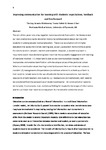Improving communication for learning with students: expectations, feedback and feedforward
| dc.contributor.author | Ley, T | |
| dc.contributor.author | Kisielewska, J | |
| dc.contributor.author | Collett, T | |
| dc.contributor.author | Burr, SA | |
| dc.date.accessioned | 2019-01-15T21:20:09Z | |
| dc.date.issued | 2019 | |
| dc.identifier.issn | 2312-7996 | |
| dc.identifier.issn | 2312-7996 | |
| dc.identifier.uri | http://hdl.handle.net/10026.1/13149 | |
| dc.description.abstract |
<ns3:p>This article was migrated. The article was marked as recommended. The aim of this paper is to draw together numerous strands from within the literature and our own practice to provide advice for improving communication about learning with students in undergraduate medical education. There is an assumption within higher education that assessment drives learning and, as such, assessment forms the focal points for communication between teachers and students. However, a broader approach is required to avoid misunderstandings and maximise the successful engagement with learning of everyone involved. It is important to plan a clear communication strategy that incorporates and enables identification with the unique values of the particular school. Where communication about learning is overtly discussed there are three main areas to consider: (1) management of expectations (sometimes referred to as feed up or feed in) that needs to include not only the use of authentic formative assessments, but also the viewpoints of both teachers and students. (2) Feedback and (3) Feedforward, both need to be considered from the perspectives of student and teacher. All communication needs to be inclusive, it's structures must provide scaffolding for respectful exchanges of information, and this will have clear practical consequences for the activities within the school.</ns3:p> | |
| dc.format.extent | 1-10 | |
| dc.format.medium | Electronic-eCollection | |
| dc.language | en | |
| dc.language.iso | en | |
| dc.publisher | Association for Medical Education in Europe | |
| dc.subject | communication | |
| dc.subject | feed in | |
| dc.subject | feed up | |
| dc.subject | feedback | |
| dc.subject | feedforward | |
| dc.subject | formative assessment | |
| dc.subject | managing expectations | |
| dc.title | Improving communication for learning with students: expectations, feedback and feedforward | |
| dc.type | journal-article | |
| dc.type | Journal Article | |
| plymouth.author-url | https://www.ncbi.nlm.nih.gov/pubmed/38089318 | |
| plymouth.issue | 1:14 | |
| plymouth.volume | 8 | |
| plymouth.publication-status | Published online | |
| plymouth.journal | MedEdPublish | |
| dc.identifier.doi | 10.15694/mep.2019.000014.1 | |
| plymouth.organisational-group | /Plymouth | |
| plymouth.organisational-group | /Plymouth/Faculty of Health | |
| plymouth.organisational-group | /Plymouth/Faculty of Health/Peninsula Medical School | |
| plymouth.organisational-group | /Plymouth/Users by role | |
| plymouth.organisational-group | /Plymouth/Users by role/Academics | |
| dc.publisher.place | Scotland | |
| dcterms.dateAccepted | 2019-01-15 | |
| dc.rights.embargodate | 2019-1-19 | |
| dc.identifier.eissn | 2312-7996 | |
| dc.rights.embargoperiod | Not known | |
| rioxxterms.versionofrecord | 10.15694/mep.2019.000014.1 | |
| rioxxterms.licenseref.uri | http://www.rioxx.net/licenses/all-rights-reserved | |
| rioxxterms.type | Journal Article/Review |


